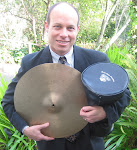If we make the reasonable proposition that human nature has not changed much in 700 years, we have much to worry about.
Michael Pollan has inferred that low food prices have kept the American middle class from revolting against the politicians, since middle class incomes have stagnated over the last decade. (See The Food Movement, Rising here.) In fact, he claims that cheap food is at least partly responsible for low wages.
Well, the cheap food party is over. The nanny state looks to raise prices by taxing what it considers "unhealthy." (See my satirical post on the subject here.) Additionally, global food prices are being pressured upward by voracious demand from Asia. Produce and cereal prices have risen astronomically in the last few years, and I see few reasons for that long-term trend to change. As we move past peak oil and energy and fertilizer prices increase, it costs more to grow food. Lastly, national US debt has swollen 40 percent higher over the last three years, (see the link here) and that will lead eventually to higher inflation and higher food prices. Unfortunately, desperate times lead to desperate people in both the 14th and 21st centuries.
I'm not the only one that senses impending problems.
A chain of three stores that sells survival food and gear reports a jump in sales to people who are getting prepared for the “possible collapse” of society.See the article here.





No comments:
Post a Comment